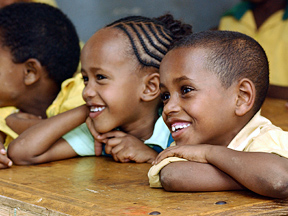Children
Education First
One of the highlights of the 67th Session was the launch of the Secretary-General's new initiative Education First. Education is the basic building block of every society. It is the single best investment countries can make towards building prosperous, healthy and equitable societies.
In the aftermath of World War II, the plight of Europe’s children was grave, and a new agency created by the United Nations stepped in to ease the suffering. In presenting the 1965 Nobel Peace Prize to the UN Nations Children’s Fund (UNICEF), Mrs. Aase Lionaes of the Nobel Committee described the scene:
“These were the children UNICEF came to help in Europe during that fearful, bitter winter of 1947 - undernourished, ill, clad in rags, homeless, and starved after five years of war and occupation. … It was for these children in fourteen different countries that UNICEF provided a lifeline - a stream of food, medicine, clothes, and footwear. Never before had we witnessed an international relief campaign for children on such a scale. During the winter of 1947-1948 UNICEF was able to report that it gave six million children and mothers one meal everyday.”

In 1953, the General Assembly, converted UNICEF into a permanent child-aid organization, to improve “the indescribably miserable conditions in which hundreds of millions of children lived in the developing countries”, as Mrs. Lionaes put it. It has been in the vanguard of the UN system’s commitment to children — their survival, protection and development— ever since.
UNICEF’s work is guided by the landmark Convention on the Rights of the Child and its aims are supported by the UN family. From UNESCO’s focus on education, to the ILO’s efforts to abolish child labor, to the special representative on the plight of children in war. From relief provided by the World Food Programme (WFP) to disease-eradication campaigns by the World Health Organization (WHO).
Global Strategy for Women’s and Children’s Health mobilizes resources to save the lives of more than 16 million women and children
In the lead-up to the Millennium Development Goals (MDGs) Summit in September 2010, the Secretary-General launched a global effort convening 40 key leaders to define a collective strategy for accelerating progress on women's and children's health .
The UN strives to protect children from violence, and special human rights rapporteurs work to prevent their exploitation through trafficking, prostitution and pornography. Children’s needs and rights are addressed in the Millennium Development Goals, and in the plans emerging from major UN conferences.
The UN system is also there for children in specific parts of the world -- from the special representative for West Africa, to the UN-backed Special Court for Sierra Leone, to the UN Relief and Works Agency for Palestine Refugees in the Near East (UNRWA). The needs of children in particular subgroups of society — migrant workers, indigenous peoples and the disabled — are protected through various UN-sponsored legal instruments, as well as by efforts on the ground and coordination with the NGO community.
The needs of children pervade the work of the UN system.
“The forced recruitment and use of child soldiers is one of the most appalling human rights abuses in the world today. Many thousands of children are being exploited. Every day, they are compelled to endure and inflict violence that no child should ever have to experience. This is unacceptable. The recruitment and use of children in warfare violates international law. It also violates our most basic standards of human decency. The entire United Nations system and I are determined to stamp out such abuse.”
Secretary-General Ban Ki-moon
Remarks at culminating event of "The Red Hand Day Campaign"
New York (USA), 12 February 2009